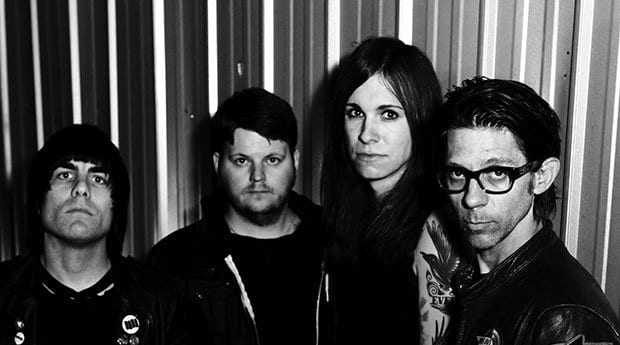It’s been an intense couple of years for Against Me! front woman Laura Jane Grace. In 2012, she came out publicly as transgender, a difficult move at the best of times that was magnified exponentially by her very public rock-star status.
At the same time as Grace was coming out and transitioning, she and her band were recording their sixth studio album. Then bassist Andrew Seward and drummer Jay Weinberg left the band, and Grace embarked on a solo tour.
With the release of Transgender Dysphoria Blues in January 2014 to critical acclaim, things seem to once again be looking up for Against Me! Xtra spoke with Grace about how she navigated her transition in the public eye, the album and how punk rock and gender non-conformity can come together to challenge the patriarchy.
Xtra: So tell me about deciding to transition. What led you to finally take that step?
Laura Jane Grace: I think that everyone’s on their own timeline when it comes to that step. And for whatever reasons, whatever happens in your life, just eventually, you get to that point of abandon, if that’s what you want to call it, where you’re like, ‘This is what I need to do to stay sane and stay alive and to be honest with myself.’ So that just took me a little while to get to, but I got there.
Do you think that being in a band is part of what slowed that process down for you?
It was definitely good for distracting and for not dealing with myself, working out problems that I was having or anything. Just going on tour. So that definitely, I think, extended the period of time, for sure. I just kind of all of a sudden woke up one morning and I was 30 years old and completely miserable, even though I had so many positive things happening, and realized that that was kind of the issue and just had to deal with it.
Being in the music industry and having been signed to some major labels (Fat Wreck Chords, Warner Bros), did you ever feel pressured to perform a masculine gender role?
That was specifically kind of one of the things that really built up to the point of [me] realizing I needed to do something about it. Especially when you’re in the major label world, you’re very much pitted against other front people. And when you’re perceived as male, you’re going to be pitted against other male front singers and kind of pushed, even if not directly or verbally, to fit the mould of “this is what a front singer should be, and this is the way you should talk to the crowd, and this is how you should act and how you should look in photos and videos.”
It just got to the point for me where I’d be standing up onstage every night and I didn’t know who I was and I didn’t know what I was supposed to be saying. I didn’t know what I was doing there, and it was making playing music miserable. And then also, I didn’t know who the audience was or if the audience would accept me or still be there singing along if they actually knew the way I felt or who I felt I was. It was just kind of — I hit a brick wall with all that for sure.
Having now transitioned, have you perceived that it’s changed the way you perform?
It’s not like this newest record is the first Against Me! record that I’m dealing with gender dysphoria or talking about the way it made me feel or whatever; it’s just often times it went unnoticed in the past, and so to feel like you’re writing songs that are really coming from one place and that they’re being perceived as coming from another place, there was a total feeling of disconnect. So to know that everyone’s on the same page and everyone gets it, I mean, it just makes it fun again, and I don’t have to think about anything when I’m up onstage. I just think about having a good time and whether or not my guitars are in tune.
Obviously, transitioning is a very personal process. Has it been difficult to navigate that publicly as a performer?
It’s not like you come out to the world as transgender and then you get your road map and then your compass and taught the secret handshake or something like that. You’re figuring it out as you go along, and so having to do that in the public eye and in interviews and in photos and just forever on the internet and on stages, I mean, there’s moments definitely where it can be a little stressful. But at the same time it’s kind of exhilarating, too, and again it’s brought a lot of the joy back to music that was missing for me.
I think especially for women artists, whether you’re a person of colour or you’re trans or whatever that identity is that you inhabit, there can be kind of an expectation to be a figurehead and a role model that a lot of artists struggle with. Have you found that to be the case?
Totally, and it’s something I get asked about a lot in interviews, and I always try to emphasize and stress to people that I’m a far-from-perfect human being. I’m sure there will be many moments over the course of the rest of my life where I fuck up or do something embarrassing or whatever . . . But at the same time, I do recognize that I have a platform, and I know at this point, being that this is the sixth record that we’ve done, that often times when you do press around a record it doesn’t have a lot to do with the actual music . . . So with this, you know, if someone wants to ask about it and all I have to do is answer honestly . . . if that helps anyone by sharing my story, then that’s great.
I’m just finishing up a show for AOL Originals . . . [where] I got to interview people that I wanted to talk to and hear their stories and how they define their gender and how they got to that place. They’re people who I’ve met online through Facebook, Twitter or whatever, and they’re people I’ve admired from afar, like Julia Serano, who wrote Whipping Girl. So being able to kind of use my platform to give other people a platform, and have them do the talking, that’s what I’m more interested in, or at least having that balance. And if I can do that, that’s amazing.
Your latest album, Transgender Dysphoria Blues, deals with transition and gender dissonance. How have you found punk music functioned as a medium through which you could explore those themes?
I was really always interested in the politics and in the protest and in the message [of punk rock], and the bands that I grew up listening to, bands like Crass or Poison Girls, always had a message of, you know, “Fight racism; fight homophobia; fight transphobia; no more with the class war,” and to smash gender roles, you know, fuck the patriarchy. And just all those really strong politics of punk rock that to me are the best example of what punk rock can be about, as opposed to singing about, like, some girl who broke your heart or bullshit like that. That was what punk rock always meant to me, so I always saw it as a place that was accepting of that stuff.
Did you find the experience of writing this record with your band functioned as a way for them to start to understand where you were coming from in terms of your gender identity and what you were experiencing?
In a lot of ways, this record almost killed the band. I mean, obviously half the band left over the course of making the record, and it was a really stressful time. When me and James [Bowman] were in the studio finishing up, we weren’t sure there was going to be a band, but we were determined to finish the record.
I think that that being said, for James and for Andrew [Seward], who left recently, that it definitely gave them a different perspective on maybe why I was unhappy for so long over the years or moments when I’d get stressed out . . . So it definitely gave them a more rounded view of who I am; it couldn’t help but do that.
How do you feel going forward? Do you think that Against Me! is going to continue?
You know, we started touring on New Year’s Eve, and we’ve just kind of been out since, and it’s been amazing. It’s really refreshing to be out on tour and feel like everyone in the band is on the same page, everyone’s out here for the same reasons, wanting to play music and have a good time . . . So as long as it’s really good, of course I want to keep doing it!
How do you see your transition affecting your music going forward?
It’s hard to say . . . This isn’t the first time that an Against Me! record has a song dealing with these subjects. It’s just the first time that I’ve been vocal in saying that they’re about these things or that maybe sometimes they’re a little more overt. So in a way, I guess that I don’t have to compartmentalize those feelings anymore, so it doesn’t kind of have to manifest itself in songwriting anymore.
I feel like it may work in the opposite way that some people think it might work. It feels good to kind of have that off my chest, and I feel like this record is really me working through that, and I’ve worked through it, and I don’t know — going forward we’ll just have to see what happens.
Against Me! play Sun, Aug 3 at Ritual Nightclub
Doors at 8pm; show starts at 9pm
$23
19+
For more about Against Me!, including upcoming tour dates, visit againstme.net.


 Why you can trust Xtra
Why you can trust Xtra


